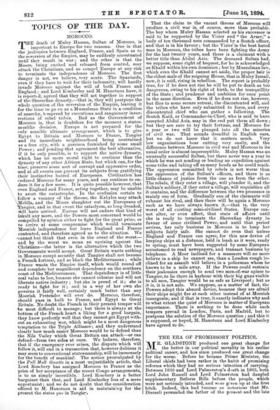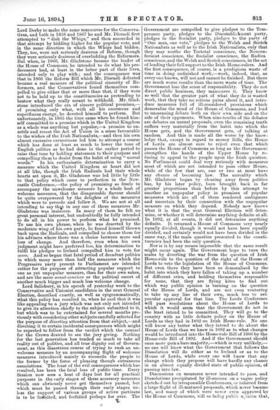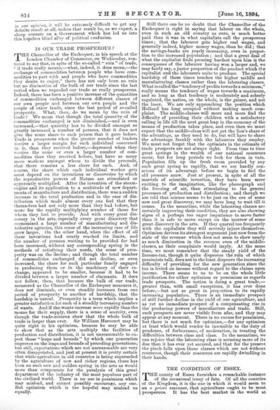THE ERA OF PROMISSORY POLITICS.
MR. GLADSTONE produced one great change for the better in our political morality in his earlier political career, and has since produced one great change for the worse. Before he became Prime Minister, the Liberal chiefs had been rather in the habit of promising reforms which they had no serious intention of carrying. Between 1850 and Lord Palmerston's death in 1865, both Lord John Russell and Lord Palmerton had dangled supplementary Reform Bills before the people, which were not seriously intended, and were given up at the first hitch. Indeed, this had become so notorious that Mr. Disraeli persuaded the father of the present and the late Lord Derby to make the same manceuvre for the Conserva- tives, and both in 1858 and 1867 he and Mr. Disraeli first attempted to a dish the Whigs," and then succeeded in that attempt by bidding higher for the popular vote, and in the same direction in which the Whigs had bidden. They, too, were not seriously desirous of Reform though they were seriously desirous of overbidding the Reformers. But when, in 1866, Mr. Gladstone became the leader of the House of Commons, he intended to do what his pre- decessors had, at least in the latter part of their lives, intended only to play with ; and the consequence was that in 1866 the Reform Bill which Mr. Disraeli defeated became a real measure of the political sincerity of Re- formers, and the Conservatives found themselves com- pelled to give either that or more than that, if they were not to be held up to the constituencies as pretending to bestow what they really meant to withhold. Mr. Glad- stone introduced the era of sincere political promises,— of promising only what, with all his enormous and superfluous energy, he devoted himself to perform. But unfortunately, in 1885 the time came when he found him- self committed to a promise which in the United Kingdom as a whole was anything but popular,—a promise to un- settle and recast the Act of Union in a sense favourable to the wishes of the Irish Nationalists,—and then his own almost excessive earnestness led him to attempt a course which has done at least as much to lower the tone of English politics as he had done in the earlier period to raise that tone by holding statesmen to their purpose and compelling them to desist from the habit of using "unreal words." In his enthusiastic determination to carry a measure which the United Kingdom at heart did not at all like, though the Irish Radicals had their whole hearts set upon it, Mr. Gladstone was led little by little to that policy which came to perfection in the New- castle Conference,—the policy of promising so freely to accompany the unwelcome measure by a whole host of welcome measures, that the disagreeable flavour should be quite overpowered by the delights of the measures which were to precede and follow it. We are not at all intending to say thlt in any one of these measures Mr. Gladstone was insincere. In many of them he felt no great personal interest, but undoubtedly he fully intended to do all in his power to perform what he promised. To use his own phrase, when he was deserted by the moderate wing of his own party, he found himself thrown back upon the Radicals, and compelled to choose them for his advisers where there was a. choice between more and less of change. And therefore, even when his own judgment might have preferred less, his determination to fulfil his pledges to Ireland compelled him to vote for more. And so began that fatal period of decadent politics in which many more than half the measures which the Progressive party present to Parliament are intended rather for the purpose of attracting popular support to one as yet unpopular measure, than for their own sakes, and are the mere avant-couriers or the political escort of another much bigger and much less welcome change. Lord Salisbury, in his speech of yesterday week to the Conservative and Unionist candidates in the next General Election, described exactly, as well as epigrammatically, what this policy has resulted in, when he said that it was like appealing to a jury which was not only not intended to give its attention chiefly to the subject submitted to it, but which was to be entertained for several months pre- viously with considering other subjects carefully selected for the purpose of diverting attention from that subject,—and directing it to certain incidental consequences which might be expected to follow from the verdict which the counsel for the Crown desired to see the jury giving. Nothing for the last generation has tended so much to take all reality out of politics, and all true dignity out of Govern- ment, as this disastrous course of trying to rush an un- welcome measure by an accompanying flight of welcome measures introduced mainly to reconcile the people to the former by the force of pleasing though extraneous associations. The least of the evil consequences which has resulted, has been the fatal loss of public time. Every Session now sees a host of days lost for all practical purposes in the early stages of these accessory measures which can obviously never get themselves passed, but which must be passed through their early stages un- less the support of various groups of active partisans is to be fosfeited, and forfeited perhaps for ever. The Government are compelled to give pledges to the Tem- perance party, pledges to the Disestablithment party, pledges to the Socialist party, pledges to the party of "One man, one vote," pledges to the Welsh and Scotch Nationalists as well as to the Irish Nationalists, only that they may soothe the Teetotal conscience, the Noncon- formist conscience, the Socialist conscience, the Radica conscience, and the Welsh and Scotch consciences, in the act of lending their full support to the Irish Home-rulers. And the first consequence, of course, is a prodigious waste of time in doing unfinished work,—work, indeed, that, as every one knows, will not and cannot be finished. But there are much worse results than the mere waste of time. The Government lose the sense of responsibility. They do not direct public business, they manceuvre it. They know so well that the greater part of what they do is wasted work, that they take no serious pains about it, and intro- duce measures full of ill-considered provisions which demoralise the mind of the House of Commons, and lead to unmeaning debate both on their own side and on the side of their opponents. When nine-tenths of the debates are debates on unreal proposals, even the remaining tenth suffers very materially from the habit into which the House gets, and the Government gets, of talking at random. And this is made all the worse by the know- ledge that, except in regard to money Bills, the House of Lords are almost sure to reject even that which passes the House of Commons so long as the Government strengthen the hands of the Upper House by re- fusing to appeal to the people upon the Irish question. No Parliament could deal very seriously with measures most of which are not intended to pass either House, while of the few that are, one or two at most have any chance of becoming law. The unreality which Mr. Gladstone began by clearing away from politics has, by his later policy, been brought back in far greater proportions than before by this attempt to smother an unpopular policy in promises of popular measures which are all of them rendered ambiguous and uncertain by their connection with the unpopular measure on which they depend. Nobody now knows what it is that the next General Election will deter- mine, or whether it will determine anything definite at all. In 1892, at all events, it did not determine anything definite. It returned a House of Commons very nearly equally divided, though it would not have been equally divided, and certainly would not have been divided in the same way, if the main question presented to the consti- tuencies had been the only question.
Nor is it by any means impossible that the same result might occur again. The Government hope to turn the scales by diverting the war from the question of Irish Home-rule to the question of the right of the House of Lords to veto the legislation of the House of Commons. But even there they have been so demoralised by the habit into which they have fallen of taking up a number of different cries, and holding themselves responsible for none, that they are flying kites to find out which way public opinion is turning on the question of the House of Lords, and are not even venturing to take up any line of their own, much less to ask popular approval for that line. The Leeds Conference will pass resolutions about the House of Lords to which it would seem that the Government do not in the least intend to be committed. They will go to the country with as little definite policy on the House of Lords as they had in 1892 on Irish Home-rule. No one will know any better what they intend to do about the House of Lords than we knew in 1892 as to what changes would be introduced into the Home-rule Bill of 1886 by the Home-rule Bill of 1892. And if the Government should once more gain a bare majority,—which is very unlikely,— no one will know what the Government that follows the Dissolution will do either as to Ireland or as to the House of Lords, while every one wiM know that any change which they propose will have hardly any chance in an almost equally divided state of public opinion, of passing into law.
Discussions on measures never intended to pass, and Dissolutions precipitated by ill-success on a vague policy sketched out by irresponsible Conferences, or inferred from a large flight of ill-matured proposals, which never became law, and many of which were never even approved by the House of Commons, will so befog public o?inion that, in our opin;on, it will be extremely difficult to get any definite result at all, unless that result be, as we expect, a sharp censure on a Government which has led us into this hopeless blind alley of political confusion.




































 Previous page
Previous page